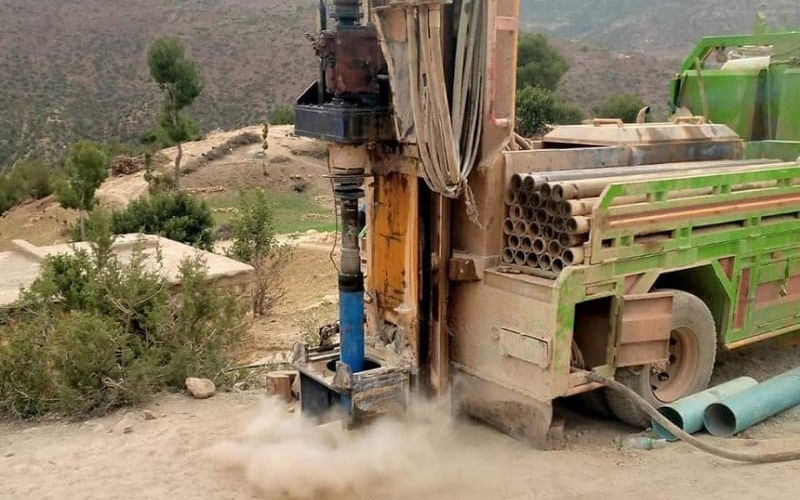Drought Crisis Deepens: Ouarzazate Bans New Well Drilling as Water Tables Plummet

The persistent drought, combined with the scarcity of water resources and the worsening deficit of groundwater tables, have prompted the Ministry of Equipment and Water to prohibit the Drâa-Oued Noun Hydraulic Basin Agency from issuing drilling permits for wells to agricultural investors on collective lands in the province of Ouarzazate.
In response to a written question from the Haraki group in the House of Representatives, the ministry explained that "the situation of water resources in the province of Ouarzazate has experienced a significant deficit due to the low level of precipitation caused by climate change and the succession of drought years," adding that "this deficit reached 85% for the year 2023-2024, and 9% as of March 31, 2025." This situation "has had an impact on the volume of water inflows, which in turn has experienced a deficit estimated at 46% during the current year," and has led to "a continued decline in groundwater stocks, with an annual deficit recorded for the Skoura groundwater table of around 3 million cubic meters, and for the Taznakht groundwater table of around 0.9 million cubic meters."
"Despite the slight and perceptible improvement in the level of groundwater resources thanks to the precipitation recorded in the province of Ouarzazate at the beginning of the 2024-2025 agricultural season, the volume of water extracted exceeds the volume of renewable water," the ministry said, stressing that "the authorization to drill new wells or water holes would lead to an increase in the deficit of groundwater tables, and would negatively affect the drinking water supply systems as well as existing agricultural investments." The department insisted that "the revitalization of the groundwater tables of the Upper Drâa basin depends essentially on the melting of the snows of the High Atlas, which has also experienced a notable decline in recent years."
Faced with this situation, "the local administrative authority has held a series of meetings of the provincial water committee, chaired by the governor of the province of Ouarzazate, which have resulted in a series of measures aimed at protecting and ensuring the sustainability of water resources." These measures include the temporary prohibition of all authorizations for the extension of irrigated lands, pending the improvement of climatic conditions and the reconstitution of groundwater tables, the drilling of wells or water holes for drinking water supply or industrial purposes, and deepening or replacement according to irrigation needs. These measures also include a total ban on issuing permits for agricultural purposes, or renting out land for agricultural investment.
"These measures are part of the implementation of the guidelines contained in the royal speech of His Majesty King Mohammed VI - may God assist him - on the occasion of the 25th anniversary of the Throne Feast, in which he stressed the need to ensure at least 80% of irrigation water needs at the national level," the ministry recalled, noting that "this rate could not be achieved during the last six hydrological years," and that it is working "in coordination with the hydraulic basin agencies and the parties concerned to study the appropriate solutions to achieve it." And to conclude: "The current situation of water stress requires reconciling the supply and demand of existing water resources and ensuring their sustainability, by respecting and implementing the aforementioned recommendations, until the improvement of the water deficit situation."
Related Articles
-

Tangier Court Orders Council to Pay 5.4 Million Dirhams in Road Work Dispute
1 August 2025
-

Moroccan Singer’s Husband Murder Trial Delayed: ’Turbo’ and 5 Others Await Justice
1 August 2025
-

Rotten Fish and Health Hazards: Tangier Port Restaurants Under Fire for Hygiene Violations
1 August 2025
-

Polisario Challenges Morocco’s Autonomy Plan: Sahara Conflict Intensifies
1 August 2025
-

Morocco’s Military Modernization: From Apache Helicopters to Homegrown Defense Industry
1 August 2025